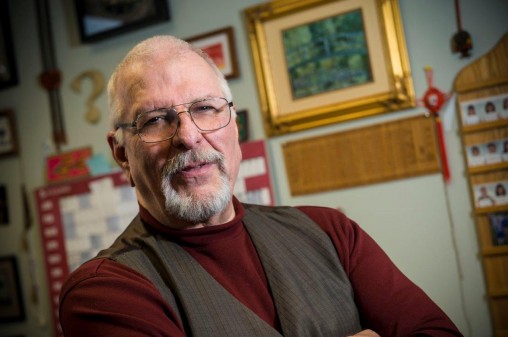
Chris Hall, associate professor of English, is working with universities in China to participate in Wright State’s Teaching English to Speakers of Other Languages program.
The number of Chinese college students training at Wright State University to teach English is poised to balloon under a plan to partner with a university in China.
English professor Chris Hall presented a proposal to universities in Xi’an, China, to participate in Wright State’s longstanding Teaching English to Speakers of Other Languages (TESOL) program.
“Chris is a great ambassador for Wright State, and his expertise in this area is perfect for such international programmatic explorations and negotiations,” said Jennifer Buckwalter, assistant dean for community and student engagement in the College of Liberal Arts.
Xi’an is a cosmopolitan city of 6.5 million in northwest China and was that nation’s capital for 13 dynasties.
“There is a huge program in China of teaching Chinese as a second language to the business populations around the world, to academics, to students who want to study in China,” Hall said. “We tapped into this.”
He said he tried to persuade the officials at Xi’an University of Arts and Sciences that good training is what makes good teachers of English.
“We’ll give them excellent, outstanding training,” he said. “They will return to China, and they know the country, the culture, everything. That will make them much more knowledgeable teachers. The officials found that rather appealing; they liked that idea.”
Shaanxi Normal University in China wants its faculty to learn how to teach English. Xi’an University of Arts and Sciences is interested in its students enrolling in the TESOL 3+1+1 program. The Chinese students would complete three years of undergraduate study at their home university, then come to Wright State for one year to get a TESOL certificate and have the option to go another year at Wright State for a master’s degree in TESOL.
“It would mean they have reached the highest level of professionalism as an English teacher to speakers of other languages,” Hall said.
Wright State’s TESOL program is more than 30 years old. Those in the program include Chinese, Saudi and other international students who want to teach English. The program also includes English-speaking American students who want to teach English.
“The program has gotten more popular,” Hall said. “One reason is you can find a job.”
Many graduates teach at U.S. universities. A few are hired by international business executives in the United States as tutors. Others find employment overseas.
“We’ve got a very good crop of students here,” Hall said. “A lot of them come from the literature program. They love literature, but they also want a career and a well-paying job. I also have students from modern languages, sociology and political science. They are the ones who have the cultural sensitivity and see it as a career in which they can study other cultures.”
One graduate, who is from Mexico, got a job in Chicago training Mexican bakers in American-style baking and teaching English at the same time.
Hall arrived at Wright State in a roundabout way.
After obtaining his Bachelor of Fine Arts from the University of Utah in the study of drama, he worked and studied in Israel for a couple years. He returned to Utah for his master’s in English with a concentration of teaching English as a second language. He then taught at Utah and the University of Wyoming before getting his Ph.D. in applied linguistics from the University of New Mexico.
Hall joined the faculty at Wright State in 1989. He applauds the university for supporting the TESOL program and encouraging its growth.
“It is special,” he said. “And it’s gotten a good name.”
Wright State is engaged in a $150 million fundraising campaign that promises to further elevate the school’s prominence by expanding scholarships, attracting more top-flight faculty and supporting construction of state-of-the-art facilities. Led by Academy Award-winning actor Tom Hanks and Amanda Wright Lane, great grandniece of university namesakes Wilbur and Orville Wright, the campaign has raised more than $110 million so far.

 Wright State to expand nursing facilities to meet workforce needs and prepare more graduates for in-demand careers
Wright State to expand nursing facilities to meet workforce needs and prepare more graduates for in-demand careers  Wright State student-athletes make a lasting impact on local family with more to come
Wright State student-athletes make a lasting impact on local family with more to come  Wright State names Rajneesh Suri dean of Raj Soin College of Business
Wright State names Rajneesh Suri dean of Raj Soin College of Business  ‘Only in New York,’ born at Wright State
‘Only in New York,’ born at Wright State  Wright State president, Horizon League leaders welcome new commissioner
Wright State president, Horizon League leaders welcome new commissioner 